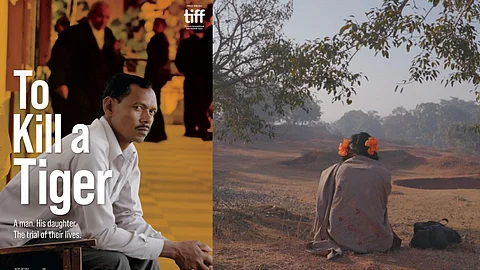
- HOMEGROWN WORLD
- #HGCREATORS
- #HGEXPLORE
- #HGVOICES
- #HGSHOP
- CAREERS
- ABOUT US
- CONTACT US

In oscar-nominated documentary 'To Kill A Tiger', Nisha Pahuja courageously navigates the tumultuous waters of sexual violence in rural India. Beyond its gripping narrative of tragedy and resilience, the film portrays the powerful bond between a father and his daughter amid the relentless pursuit of justice.
Set in Bero, Jharkand, the documentary follows the journey of a father fighting for justice for his daughter, who has been brutally assaulted by three men from their village. What begins as a heart-rending tragedy evolves into a powerful narrative of defiance and hope as the father refuses to succumb to societal pressures and fights relentlessly for his daughter's rights.
One of the prominent takeaway of 'To Kill a Tiger' is its portrayal of the multifaceted dynamics within the village community. The film exposes the pervasive culture of victim-blaming and impunity that often accompanies cases of sexual violence. However, it also highlights the father's unwavering resolve to seek justice for his daughter - defying the insidious pressures of his village community.
In a society where victim-blaming and patriarchal norms are often dominant, his steadfast support for his daughter becomes a revolutionary act of defiance. Through intimate interviews and raw storytelling, Pahuja confronts viewers with uncomfortable truths about gender-based violence and the systemic failures of the justice system.
Moreover, the film offers a searing commentary on the corrosive influence of groupthink mentality. Within the confines of the courtroom, the defense's callous dismissal of the victim's trauma epitomises the collective denial and moral bankruptcy that pervades the village. The chilling refrain, "It takes a whole village to destroy a child," is portrayed throughout the narrative; underscoring the communal culpability in perpetuating harm.
Despite the overwhelming challenges they face, the daughter's courage becomes a source of inspiration for her father, emboldening him to confront his deepest fears and insecurities. Through their symbiotic relationship, the film illustrates the transformative power of familial bonds in the pursuit of justice and redemption.
Ultimately, ‘To Kill a Tiger’ culminates in a watershed moment of triumph and vindication, as the perpetrators are met with the full force of justice. The father's resolute determination to "kill the tiger" is as a potent metaphor for the relentless pursuit of justice in the face of seemingly insurmountable odds. In a society rife with entrenched inequities and systemic injustices, his victory serves as a light of hope and a clarion call for collective action.
'To Kill A Tiger' is a film that not only received an Academy Award nomination at this year's ceremony but also clinched an impressive array of 19 awards from other prestigious festivals across the world. It stands as a masterful exploration of the human condition as it grapples with the complexities of morality, justice, and societal change.
'To Kill A Tiger' is available to stream via Netflix.
Watch the trailer below.
If you enjoyed reading this, here's more from Homegrown:
Indian Short Film 'The Silent Ripples' Captures The Complexity Of Envy And Class Struggle
Watch A Homegrown Film That Captures The Lives Of Old Delhi's Underprivileged
Homegrown Short Film 'Anaar Daana' Depicts The Complexity & Innocence Of Childhood Grief
